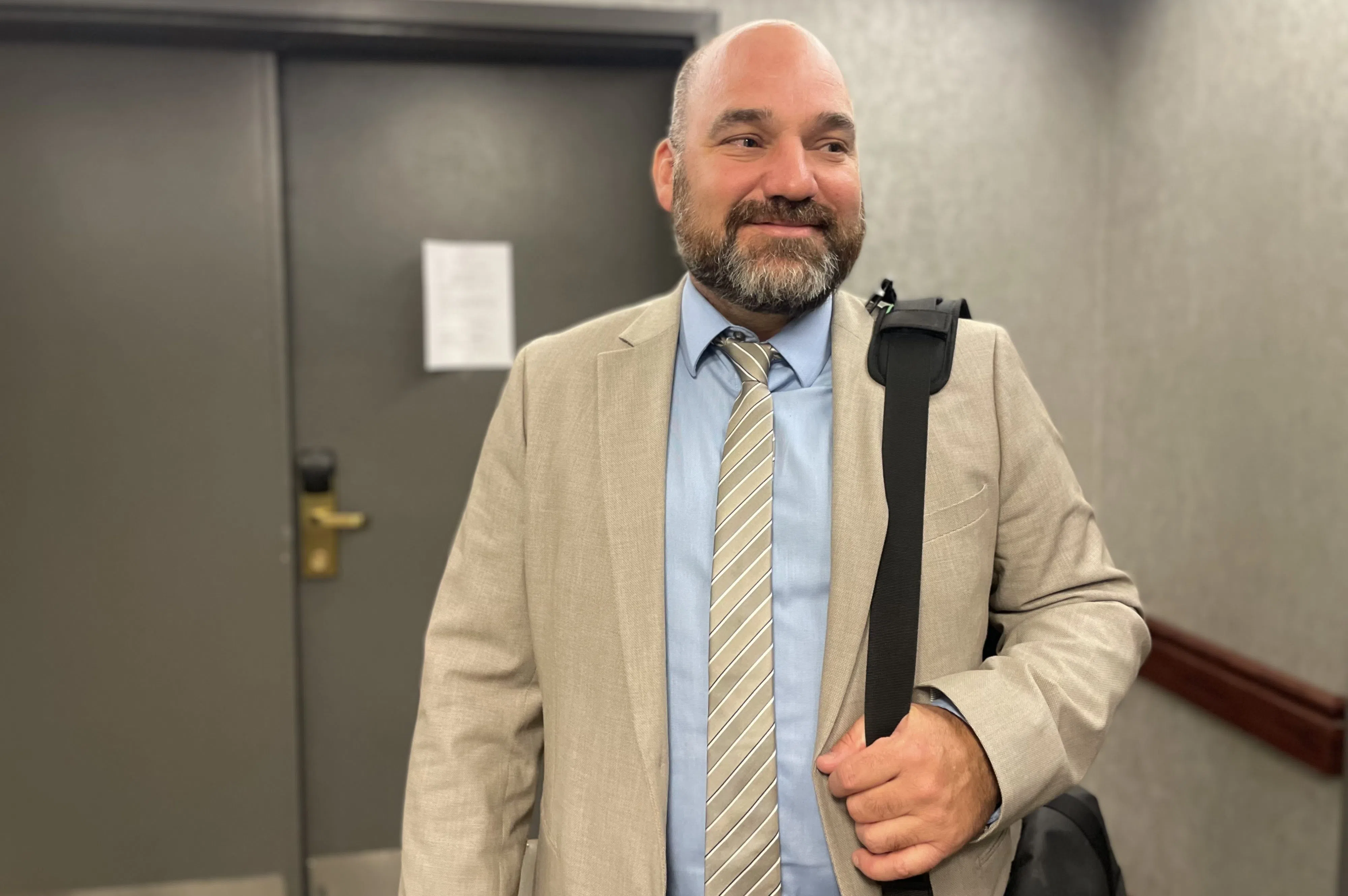A friendship cost former Saskatoon Police Service Sgt. Robbie Taylor his job earlier this year and now he wants it back.
Taylor is appealing his dismissal in a hearing that centers around his relationship with an unnamed Hells Angels associate, whose identity is protected by a publication ban.
Read more:
- Police warn of hundreds of Hells Angels in Surrey, B.C., this weekend
- Kakakaway inquest cancelled, family pursues own lawyer
- Saskatoon police arrest 52 people in second retail blitz
During the day’s proceedings, Taylor had a green-beaded rosary either wrapped around his hand or on his neck.
Day two of the hearing was dedicated to the testimony of Sgt. Alain Belleau, an expert in organized motorcycle gangs, specifically in the nature and structure of the Hells Angels and their support groups. He said in his 19 years of intelligence gathering, he’d never seen a friendship like this one.
He began his testimony by describing the nature of the Hells Angels from the opinion report he prepared for the hearing.
It’s judicial knowledge that the organization is a criminal one, with the main purpose of selling drugs, resulting in large amounts of cash for those involved, he said.
Becoming a member of the Hells Angels requires total commitment from a person and can take seven to eight years. Before getting to that level, though, one of the highest titles a person can hold is associate, he explained.
Belleau said that associates are potential candidates for membership, and as such, are considered highly trustworthy by those in the chapter. Gaining that trust also means a person has proven their commitment to the organization.
With his friend’s level of involvement in the Hells Angels, he said that he had concerns about the friendship. He even said that being a police officer and maintaining that relationship are incompatible desires.
Belleau’s top concern was the security of information.
He said the Hells Angels will try and corrupt anyone they can for their benefit.
Regarding law enforcement specifically, he said members want to gain information that could identify informants and prevent arrests and the seizure of drugs.
According to Belleau, there’s no pattern on how corruption happens, making it difficult to prevent. While he couldn’t estimate the likelihood of corrupting someone in law enforcement, he said with Taylor’s access to sensitive information, the risk is always there.
He also said that letting Taylor go back into the police service could damage the trusting relationship needed in law enforcement.
Officers wouldn’t be able to discuss investigations in front of Taylor that involve his friend. Belleau said maintaining that secrecy would be time consuming and inevitably unsustainable.
During cross-examination, though, Belleau said he didn’t find any evidence of corruption in this case, adding that he didn’t see anything to suggest Taylor provided his friend with information.
In a series of hypothetical questions posed by one of Taylor’s attorneys, Scott Hopley, the point was raised that there are police officers who have family members in the Hells Angels.
But Belleau said those relationships are different. He said in those instances officers cut off ties with the family in question, whereas in this situation, Taylor is choosing to maintain the friendship.
‘Trust was broken’
On Wednesday, Saskatoon police chief Cam McBride testified that he looked at the investigation into Taylor with a clean slate and relied on it to inform his decision to dismiss him.
Taylor was dismissed from the Saskatoon Police Service in March.
During his testimony on Wednesday, Saskatoon police chief Cam McBride noted three specific examples from the report that highlighted why Taylor was dismissed.
In the first instance, he said Taylor had intervened in a traffic stop conducted by another police officer in October of 2023 in an effort to influence the officer not to issue a ticket.
Secondly, McBride said Taylor wrote a letter to the Parole Board of Canada, seeking to provide a character reference that would give his associate an advantage in seeking a pardon.
McBride said he found the letter to be inaccurate and inappropriate, and said it raised significant concerns.
“We have an individual who is the subject of the request for the pardon being a convicted drug trafficker and member of the Hells Angels,” he said.
Finally, McBride said Taylor made a direct attempt to influence other investigators, promoting his own opinion that “he’s not someone of concern, and that he’s a really good guy.”
McBride testified that Taylor had the training, advice from his peers and work-related experience in order to make a rational and informed decision about the relationship.
“I was confident that Mr. Taylor got everything a person should need to make a wise decision, and was choosing not to,” McBride said. “That was sustained over time.”
McBride stressed the importance of maintaining the public’s trust in the police service. He said that “trust was broken” and “irreparable,” and Taylor’s actions put the police service at risk.
Brian Pfefferle, Taylor’s lawyer put forward an abuse-of-process motion at the end of the hearing. He said that it was revealed for the first time on Wednesday that a former police chief was aware of the misconduct related to the traffic stop and did not see it as worthy of pursuing further disciplinary action.
He said that Taylor was not made aware that the former police chief had been advised of the misconduct.
“The evidence will show that Sgt. Taylor is exactly what we expect of a good police officer, someone who doesn’t judge someone exclusively based on one characteristic,” Pfefferle told reporters.
Pfefferle said Taylor made associations with people with prior criminal history in an effort to assist them by being a “pro-social person” in their lives.
Pfefferle also said there is no suggestion that Taylor had shared any police information with the Hells Angels and was open and honest about his relationship with the associate.
The hearing is set to continue on Thursday morning in Saskatoon.
–with files from 650 CKOM’s Mia Holowaychuk











